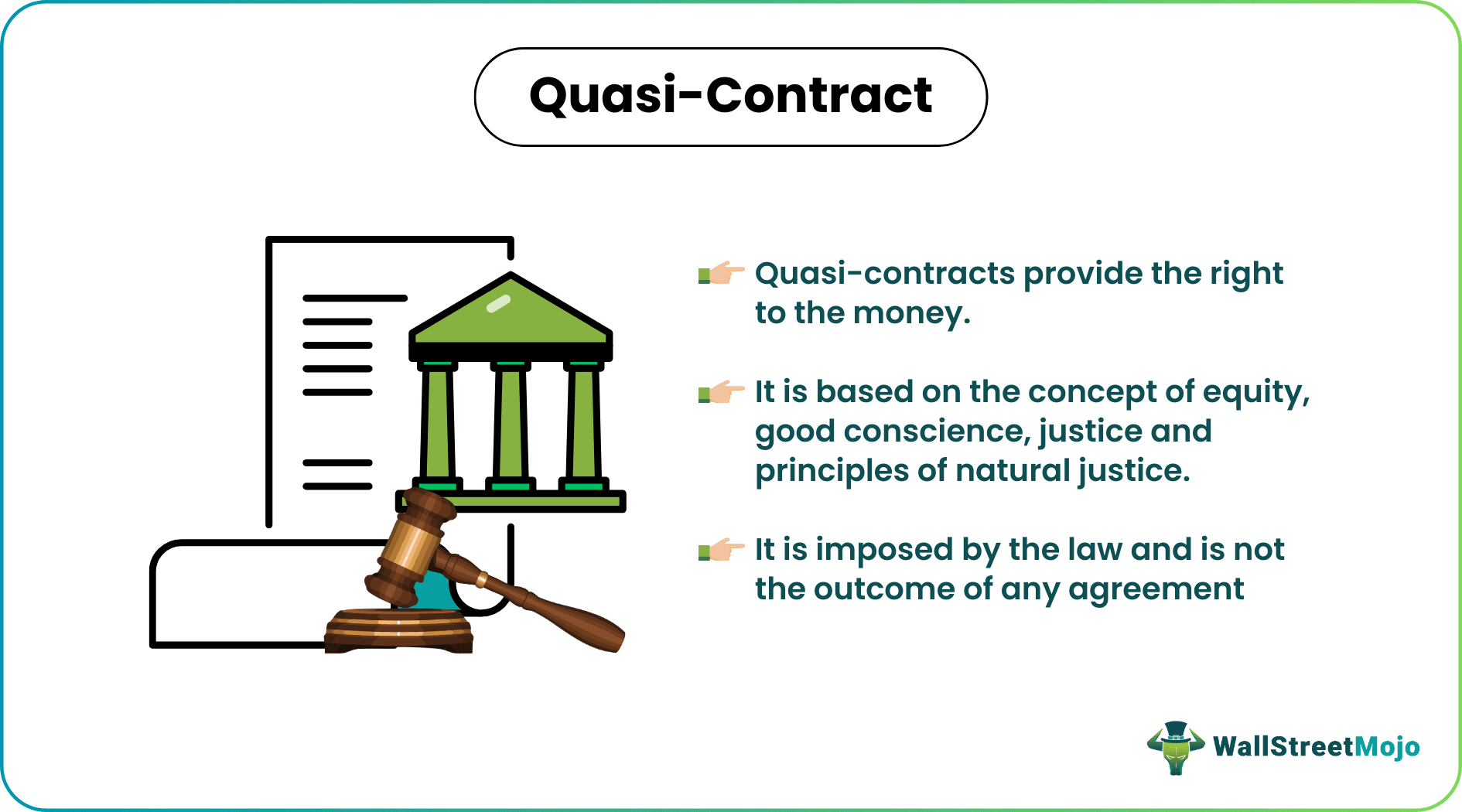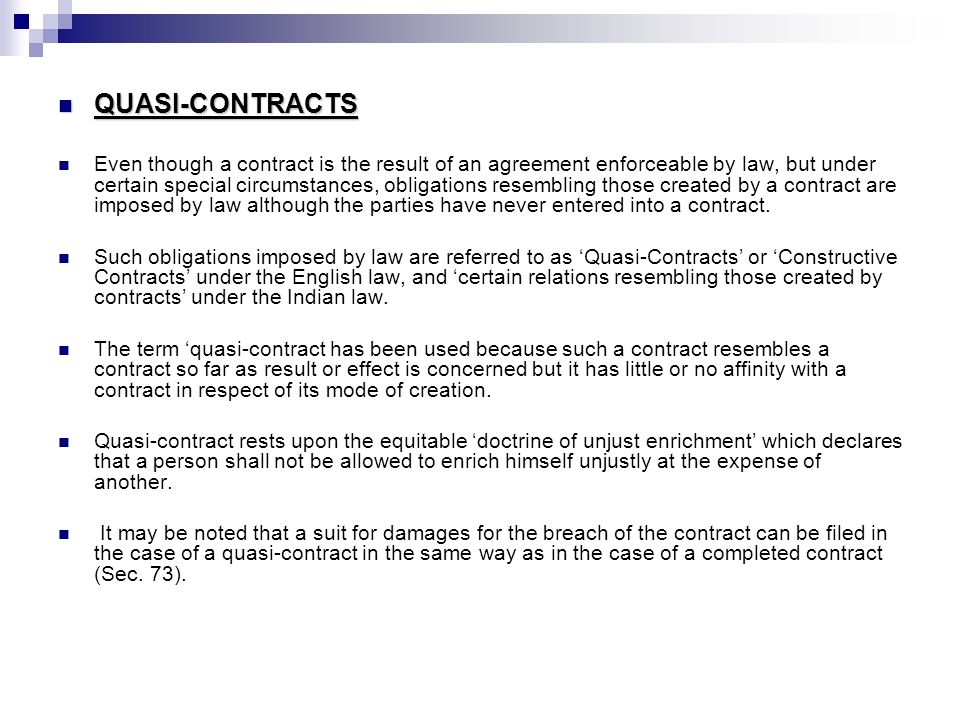Define Quasi Contract In Law - A quasi contract, or implied agreement, is a legal concept where a court enforces a deal between two parties even if they didn't formally agree, to. A quasi contract is a contract that is created by a court order, not by an agreement made by the parties to the contract. This is also called a contract implied in law or a. A quasi contract is a legal obligation imposed by law to prevent unjust enrichment.
A quasi contract is a legal obligation imposed by law to prevent unjust enrichment. A quasi contract is a contract that is created by a court order, not by an agreement made by the parties to the contract. This is also called a contract implied in law or a. A quasi contract, or implied agreement, is a legal concept where a court enforces a deal between two parties even if they didn't formally agree, to.
A quasi contract is a legal obligation imposed by law to prevent unjust enrichment. A quasi contract, or implied agreement, is a legal concept where a court enforces a deal between two parties even if they didn't formally agree, to. This is also called a contract implied in law or a. A quasi contract is a contract that is created by a court order, not by an agreement made by the parties to the contract.
Is A Quasi Contract Enforceable? Understanding Its Legal Validity
A quasi contract is a contract that is created by a court order, not by an agreement made by the parties to the contract. A quasi contract is a legal obligation imposed by law to prevent unjust enrichment. This is also called a contract implied in law or a. A quasi contract, or implied agreement, is a legal concept where.
QuasiContract Meaning, Examples, Top 5 Types
This is also called a contract implied in law or a. A quasi contract, or implied agreement, is a legal concept where a court enforces a deal between two parties even if they didn't formally agree, to. A quasi contract is a legal obligation imposed by law to prevent unjust enrichment. A quasi contract is a contract that is created.
Law quasi contract PPT
A quasi contract, or implied agreement, is a legal concept where a court enforces a deal between two parties even if they didn't formally agree, to. A quasi contract is a legal obligation imposed by law to prevent unjust enrichment. This is also called a contract implied in law or a. A quasi contract is a contract that is created.
CHAPTER 10 Introduction to Contracts ppt download
This is also called a contract implied in law or a. A quasi contract is a contract that is created by a court order, not by an agreement made by the parties to the contract. A quasi contract is a legal obligation imposed by law to prevent unjust enrichment. A quasi contract, or implied agreement, is a legal concept where.
Quasi contracts PPT
A quasi contract, or implied agreement, is a legal concept where a court enforces a deal between two parties even if they didn't formally agree, to. This is also called a contract implied in law or a. A quasi contract is a contract that is created by a court order, not by an agreement made by the parties to the.
Quasi contracts PPT
A quasi contract, or implied agreement, is a legal concept where a court enforces a deal between two parties even if they didn't formally agree, to. A quasi contract is a contract that is created by a court order, not by an agreement made by the parties to the contract. This is also called a contract implied in law or.
Understanding Quasi Contracts Definition, Examples, and Legal
A quasi contract is a contract that is created by a court order, not by an agreement made by the parties to the contract. A quasi contract is a legal obligation imposed by law to prevent unjust enrichment. A quasi contract, or implied agreement, is a legal concept where a court enforces a deal between two parties even if they.
Quasi Contracts Definition, Types, Examples & Legal Implications
A quasi contract is a legal obligation imposed by law to prevent unjust enrichment. A quasi contract is a contract that is created by a court order, not by an agreement made by the parties to the contract. A quasi contract, or implied agreement, is a legal concept where a court enforces a deal between two parties even if they.
Quasi Contract Understanding Its Legal Importance
This is also called a contract implied in law or a. A quasi contract is a legal obligation imposed by law to prevent unjust enrichment. A quasi contract, or implied agreement, is a legal concept where a court enforces a deal between two parties even if they didn't formally agree, to. A quasi contract is a contract that is created.
QUASI CONTRACT. ppt download
A quasi contract is a contract that is created by a court order, not by an agreement made by the parties to the contract. This is also called a contract implied in law or a. A quasi contract is a legal obligation imposed by law to prevent unjust enrichment. A quasi contract, or implied agreement, is a legal concept where.
A Quasi Contract Is A Legal Obligation Imposed By Law To Prevent Unjust Enrichment.
A quasi contract, or implied agreement, is a legal concept where a court enforces a deal between two parties even if they didn't formally agree, to. This is also called a contract implied in law or a. A quasi contract is a contract that is created by a court order, not by an agreement made by the parties to the contract.
:max_bytes(150000):strip_icc()/Term-Definitions_Quasi-contract-resized-0e979ead17a64b608b882e6e87f89820.jpg)





